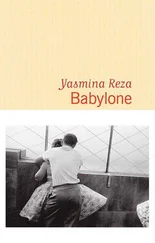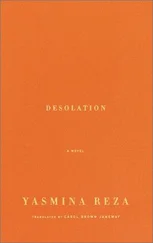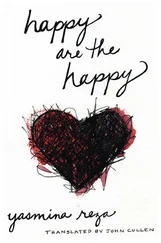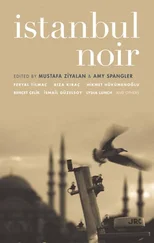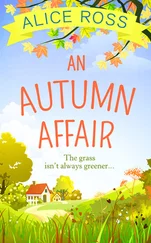“Marie-Paule,” he hears, picking up the thread of the argument God knows where (who is Marie-Paule?), “considers the whole thing is between him and me, she has no qualms about a real skull, for her death is death, she couldn't care less about it, she wants to be cremated, if people dig up bones, even to sell them, it doesn't shock her, it's a trade like any other, she says. What is it they're selling, a carcass that would have disintegrated over time, there's no longer any human element in it. You do as you like, she tells me, you're the one Andreas asked for a skull, you gave him a plastic skull that's already cost you a lot, if you have scruples there's no need for you to go any further, Marie-Paule, I tell her, I want to do what's best for him. All the same I find it a bit odd for a mother not to have any scruples about such a delicate matter.
No?”
“Yes.”
“So what is what's best for a child, do we know what's best for a child?”
“No.”
“No! But, even so, you do have a slight idea I hope!” she says in consternation.
“Yes, of course,” Adam laughs stupidly, for he no longer knows what it is he's just said no to. I should have jumped out of the car on the Boulevard Kellermann, he thinks, even at Sceaux or Antony, taken advantage of buying the Veinamitol and escaped before being trapped on the throughway. A succession of mistakes, thoughtless moments of inertia, he thinks, all contributing to predestination. It was written that I should go to Viry-Châtillon, Alexander to Persia, me to Viry. There's not a single person in the world, he tells himself, who knows I'm in this car at this spot. And there's not a single person it would interest, who might say, where's Adam, what's he doing right now, is he happy, sad, alone? Irene has lost interest in me, the children are busy, my friends … have I any? There's no one in the world, he thinks, who might feel a pang at my absence. Irene wants to be cremated, too. So does Goncharki. When the undertakers were laying out his father in the coffin, he'd remained glued to the door. He'd heard a series of alarming and gruesome noises and had found his father in the casket reduced by a good quarter. Being claustrophobic, Goncharki wanted none of that for himself. Compression, imprisonment, vermin to boot. Such was the prospect, so: cremation. Meyer Lansky had ended his days in a tiny apartment with no view. A man who'd prided himself on being more powerful than U.S. Steel. What good had being Meyer Lansky done him? Only to end up wandering through the torrid streets, lonely and sick. Whether he was buried in Miami or in Jerusalem, in accordance with his unfulfilled wishes, what difference would it make? So whether he's cremated or his skull ends up amid the toys in a child's bedroom, does that change the color of his life? For years Goncharki had been writing Meyer Lansky's Tomb. A secret celebration, a secret ode to men who don't know how to be loved. Do you still have your parents? Marie-Thérèse asks suddenly.
“Yes. I still have my parents.”
“Are they well?”
Does she know my parents? thinks Adam.
“Yes, they're well,” he lies.
“Do you see them?”
“Not very often. They live in the provinces.”
“Whereabouts?”
“InLibourne.”
“Where's that?”
“Near Bordeaux,” thinking, what's it to her? And also thinking I ought to question her in return, but I don't give a good goddamn about her parents, just as I don't give a damn about her whole life.
“And you, how about your parents?” he says.
“My father's still alive. He still lives in Suresnes.”
“And your mother?”
“My mother died when I was ten.”
“Excuse me.”
“Do your children see them?” Marie-Thérèse resumes.
“Who?”
“Your parents.”
“Not a great deal.”
“That's a pity.”
“No.”
“Why?”
“Because my parents aren't interested.”
“It's mean to say that.”
“No.”
“It's a shame for children not to know their grandparents.”
“They do know one another.”
“Not to really know them.”
“Excuse me, Marie-Thérèse, but what do you know about it? Why all these clichés? What if the grandparents are utter jerks?”
Marie-Thérèse considers. Then she says, you're exaggerating.
“Will we be there soon?”
“Very soon. We'd have got there by now if it hadn't been for those trafficjams. What'd you like to eat? I've got a little piece of beef in the freezer. I could do a little roast of beef with carrots. Or a gratin dish. Or, this is simple but it's my specialty, I could make you a good potato omelette.”
“An omelette, yes.”
He says, an omelette, yes, and a little farther on the sign reading VIRY-CHATILLON-FLEURY-MéROGIShangs there. I'm going to eat an omelette in Viry-Châtillon with Marie-Thérèse Lyoc, he thinks. He looks at his hands resting on the box of Veinamitol, hands aged more than the rest of his body, a little swollen, a little inert, but inoffensive hands, hands no one misses, he says to himself. He thinks about his children sprawled in front of the television and feels a faintness coming on, as if he were immensely far away, as if he'd lost times beyond retrieval. He thinks about the boys in their pajamas, beached on the carpet, among overturned toys, fragments of cake, candy wrappings, yogurt cartons, two animals tangled together, watching videos, commercials, and all kinds of hideous, yelling images, pell-mell, totally alone in their own way, he tells himself. And he tells himself the older boy hasn't learned his homework, he tells himself the older boy doesn't take school seriously, and the little one ought to be in bed, he tells himself Maria would do better to tuck him in and tell him a story instead of leaving him to rot in front of the television, which she's watching herself, chewing gum, her ear glued to her cell phone, he tells himself the older boy doesn't use the electric toothbrush he ordered, that the book The Conquest of the New World remains unopened, that the older boy couldn't give a damn about the conquest of the New World, and all these things of the most trivial importance that wreck his life as a man night after night, he thinks, these absurd concerns that in normal times he regards as evidence of his failure, now here, in the Wrangler Jeep, as it plunges down the ramp leading off the throughway, seem to him to constitute the heartrending substance of life itself. I must go back to Paris, he thinks, just as the Belgian brasserie, Leon de Bruxelles, appears out of the middle of nowhere, I must go back at once, Marie-Thérèse, please do a U-turn, go back onto the throughway, I must go back home, I must put my boys to bed, I must wait for my wife Irene, I must make the best of my children and my wife, I'm forty-seven, in a few years' time all that will have gone up in smoke, I haven't time to eat an omelette in Viry-Châtillon, the best is over for me, as it is for you, and the best, you see, soon comes down to nothing, take me home quickly, I'll put on my pajamas, I'll roll into a ball with the children in the double bed, we'll wait for Irene, laughing under the covers, all three of us in the dark, and we'll give her a surprise when she gets home.
The Jeep runs down a little slope. At the bottom, on a billboard, can be read YOUR APARTMENT IN VIRY.
Adam closes his eyes. At once a glittering ankle boot appears, motionless in the dark. Adam opens his eyes, reads, WITH PICTURESQUE VIEWS OF THE LAKE,and closes them again. The ankle boot is there, right in the middle, and it's green. Adam opens and closes his eyes several times. The ankle boot's still there, more or less fluorescent. Adam closes first one eye, then the other. No ankle boot. The ankle boot appears only when both eyes are closed. An ankle boot, he notes, that ultimately vanishes, but reappears at the next lowering of the lids. Maybe I'm becoming hysterical, thinks Adam. The way things are going, he thinks, shouldn't I approach Guen directly? Is it best to approach the top man directly, or continue on a semipsychoana-lytical track with the doctor who's treating me? And why should I have to grapple with this dilemma over the treatment, in addition to the illness itself? A mysterious assault has now been added to the phenomenon of dislocation, Doctor, the effects of which have not, by the way, completely disappeared, each time I close my eyes a green and highly luminous ankle boot appears. I say ankle boot, Doctor, but I could as well say sock, in truth it's a kind of medieval shoe, with a long point at the end of it, weren't they known as piked shoes , Doctor? So every time I close my eyes I see a green fluorescent piked shoe in the middle of the darkness. Is this the famous gap in the retina you and Professor Guen hinted at? Could this be the appalling macula hole you and Guen alluded to? You see, Doctor, if the ankle boot had appeared without any preliminary I might not be in this state of panic, but it appeared in the wake of the phenomenon of dislocation, which, you'll remember, had not in itself caused any change to my vision. What alarms me, Doctor, is that there's a logical sequence to this. If my retina's torn, and my feeling is that it is torn, we must admit that the dislocation was the prelude to the tear. We fear the worst and the worst happens. I don't know if you can grasp the significance of this observation. A pain occurs that we call pain or dislocation and instead of it being nothing at all , a nonevent we can take as a basis for hope, which would in some sense be God's back , it's a warning sign. Do you realize, Doctor, how serious it is that there can be no pain without a sequel? I'm circumcised, Doctor, my parents made it their duty to shield me from the laws of nature and I approve of this inheritance, symbolic though it be. So it's all the more difficult for me to concede that my body should be subject to the principle of causality. Still less the whole course of my life. Frankly speaking, the principle of causality revolts me. I put it to you, Doctor, if we suppose that my retina is not torn: what's this medieval ankle boot doing at the center of my vision? You're stumped, Doctor. Ha ha ha! I gather you've not often come across the piked shoe in your books. Ha, ha, ha! What are you laughing at? says Marie Thérèse.
Читать дальше

